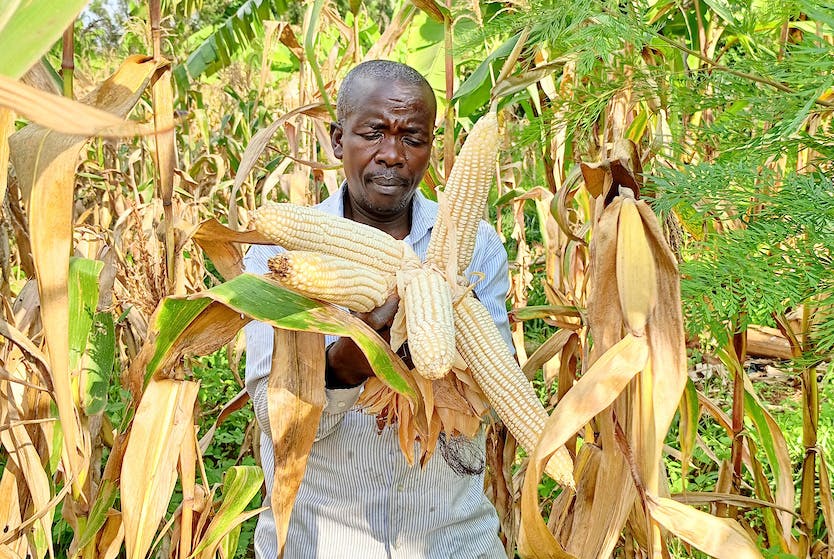Jean Marie Musengimana lives in the Mayange community in Rwanda with his wife and their four children, three boys and a girl. Today he is a successful farmer whose business is growing and thriving. He shares what he has learned with other farmers in Mayange, strengthening the entire community. But it wasn’t always this way.
Musengimana said that, before he began working with Food for the Hungry (FH) in 2018, life was very difficult for his family. They were struggling to harvest enough food to stave off malnutrition. Their staple maize crop was stunted or bore little gain as a result of overworked, infertile soil. And what crops managed to grow were relentlessly attacked by weeds and pests.
Living With Drought
Additionally, Musengimana explained, “It is normal here to face unpredictable weather. We regularly experience prolonged dry conditions and recurring drought. And that, paired with our archaic farming methods, resulted in very poor agricultural production.”
“I had been cultivating a small piece of land with no modern agricultural techniques. Fall armyworm was heavily damaging our maize, and we were losing 40% of our production,” he said.
Struggling to Survive
His family skipped meals to make the meager food supply last longer. Agriculture was their only source of income, but the poor harvests meant there wasn’t enough for their household and certainly no surplus to sell. So there were no funds for buying clothes, paying school fees, purchasing medical insurance, or other necessities – like, seed for next year’s maize crop.
“It was even difficult to buy seed for planting with our limited resources, and the seed we could buy was of poor quality,” Musengimana said.
One day, he was invited to attend an FH meeting explaining push-pull farming technology. He learned that, through the use of climate-smart pest management (CSPM), he could prevent crop losses and triple his yields while reducing greenhouse gas emissions.
Stronger Together
After the meeting, he joined a group of 16 farmers. They started to work together and attend more in-depth training to improve their household incomes through modern agricultural practices. They learned to fight stem-borers and fall armyworms by mixing desmodium and bracheria in with their plots of maize. They diversified their efforts by cultivating soybeans, beans, and fruit trees. FH provided them with improved and resistant seed, which gives more yield. The farmers also received small livestock, such as goats and pigs, and training in animal husbandry.

With the help of FH, the farmers also started a saving group. Participation allows Musengimana to access loans that enabled him to expand his farmland. He now applies best agronomic practices, using organic manures, mulching, timely planting and weeding, and early preparation of his field. The group has also strengthened his relationships with his neighbors in the community.
Reaping Successes
“My wife and I have learned to work as a team,” he said. “All we have is fully due to my wife’s involvement. Because we work together, we are able to step up our standards of living.”
The couple has planted a kitchen garden that provides vegetables for the balanced diet that they’ve learned to eat and prepare. The entire family has embraced this new way of eating, Musengimana says, and that has improved their health. Additionally, FH helped them install better sanitation facilities, such as a pit latrine, pot-drying rack, and a tippy tap to help wash hands after using the bathroom or before eating meals. All of these changes reduced the diseases that previously plagued them as a result of poor hygiene.
Musengimana is happy to share about the growth and success of their farm.
“The pig I received from FH soon produced seven piglets. I raised them and sold several. From that I had income to buy household necessities and two goats, to expand my livestock. My harvests have significantly increased due to the good agricultural practices I learned. I bought an additional half hectare of land with the loan from our saving group, and my yield increased from 300 Kg to 120 Kg of maize in one season.”

Lessons Learned
Life for Musengimana and his family has turned around dramatically because of the skills he has learned and put into practice. Additionally, he says, the entire community has been strengthened and is improving.
“I am very proud to serve as a model for other farmers now. Community members reach out to me for knowledge about modern farming methods. I feel integrated into my community and secure for the future, as I am able to easily provide for all our basic needs,” Musengimana said.
“Most of all,” he added, “I learned that working hard as a team coupled with patience and relying on God is the key to all problems I may have.”
You May Also Enjoy These Posts:


